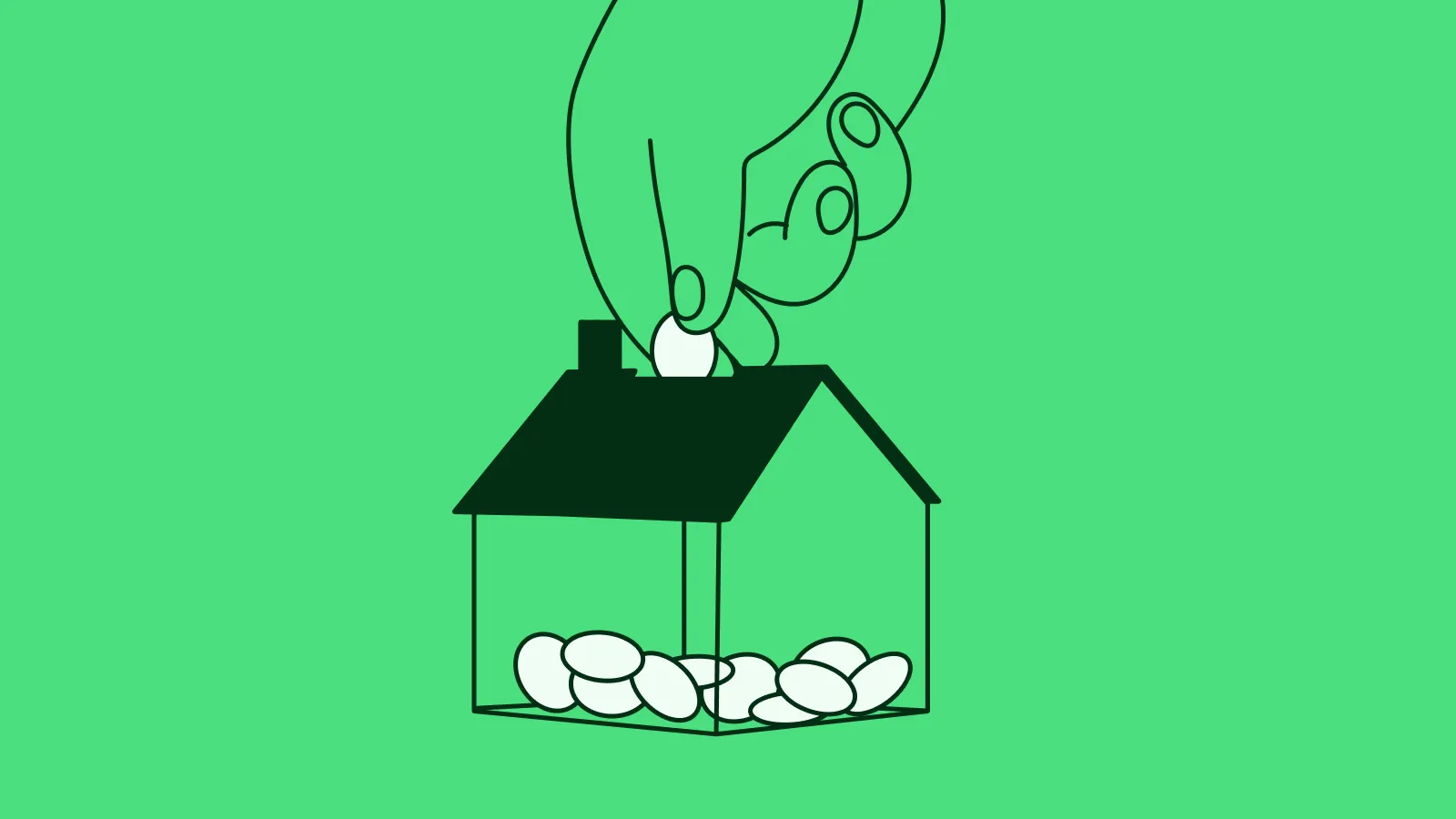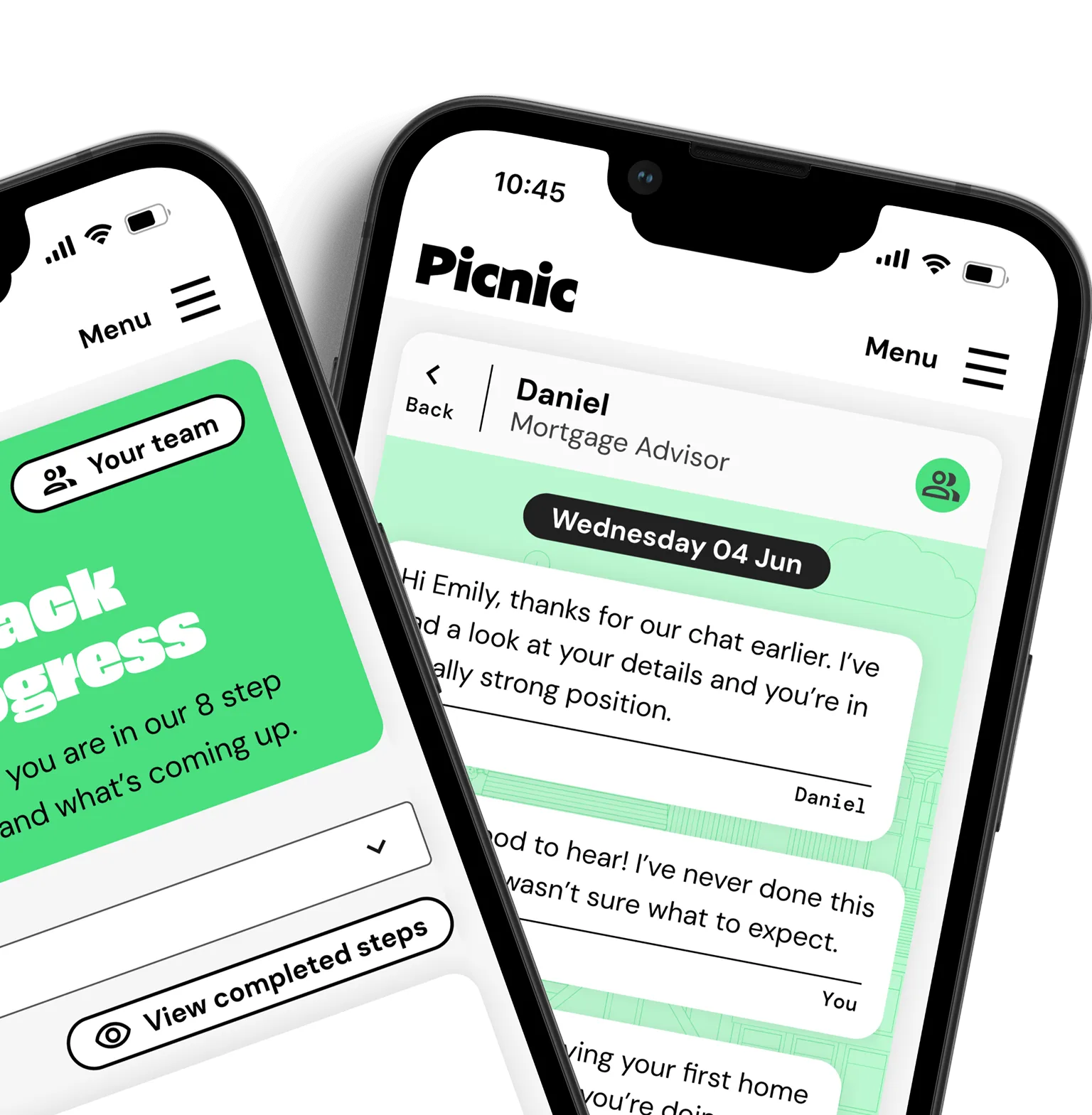Making Your Next Move
Guides
Making Sense of Moving Home
Our guides help you understand what to expect and how to plan ahead for your next home-buying journey.
14 mins
The Picnic Guide To Buying a Home

6 mins
Mortgages For Home Movers

6 mins
Choosing Your Mortgage

3 mins
How Stamp Duty Works

3 mins
Fixed-Rate Mortgages Explained

4 mins
Tracker Mortgages Explained

6 mins
Mortgage Schemes Explained

5 mins
Porting Your Mortgage

4 mins
Mortgages and Property Types

No More Guesswork
• A Decision in Principle direct from a lender
• An Eligibility check that won’t affect your credit score
Less Option Overload
• Compare 100+ lenders*
• A personalised shortlist of mortgage matches
No More Radio Silence
• Live tracker, real-time updates and messaging
• A dedicated team who keep you in the loop at every stage
Less Messy Paperwork
• Simple e-signing and document upload
• Everything in your own innovative portal

The Mortgage Experts Trusted by Experian
Picnic is Experian’s exclusive mortgage partner, trusted to make mortgages simple. With access to 100+ lenders and expert support, we’ll help you find the right fit without the stress.
Working With the Brands You Trust

Everything You Need, All in One Place
No back-and-forth emails. No printing. No guesswork.
📍Track your mortgage progress step-by-step
✍️ Sign and upload documents in seconds
💬 Message your advisor any time
✅ Stay organised and in control
Your mortgage, made simple — start to finish.
Frequently Asked Questions
Mortgages 101 for Home Movers
Straight answers to all the key questions for home movers, so you can feel in control of your next mortgage journey.
When you sell your current home and move to another, your existing mortgage is usually repaid using the proceeds from the sale. You’d then take out a new mortgage to cover the amount you need to buy your next home.
If your mortgage is "portable," you can transfer it to your new property. This is known as porting, which allows you to keep your current interest rate and terms.
It’s important to note that porting only applies to your existing mortgage deal, NOT the mortgage loan amount. So, you’ll still need to pass the standard affordability checks to get approval from your lender.
Want to know more? Take a look at our guide to Mortgage Porting.
If you’re upsizing, it’s definitely wise to have a mortgage in principle in hand, so you at least know the property values you should be considering when searching for your new home.
For the buying and selling process, having a mortgage in principle or not shouldn’t influence a prospective seller of a property you want to buy, as the fact that your current home is up for sale ought to be enough evidence of your intentions.
Are you ready to apply for a mortgage in principle? Great, just click the button below to make an enquiry and we’ll help you get your home move started.
Loan-to-value (LTV) is a term used by lenders to show the amount you’re borrowing compared to the property’s value, written as a percentage. You can work it out by dividing the mortgage amount by the property value and then multiplying by 100. So, for example, if you’re buying a £200,000 home with a £150,000 mortgage, your LTV is 75%.
The LTV is important because it affects the interest rate you're offered—generally, the lower the LTV, the better the rate, since lenders consider lower LTV loans less risky.
Mortgage equity is the part of your home that you actually own outright. So, if your home is worth £250,000 and you still have £150,000 left on the mortgage, your equity is £100,000.
The equity in your home grows over time as you pay off more of your mortgage, or if it goes up in value. You can use that equity as a deposit for your next home when you move, or release part of it when you remortgage. Think of it as a little pot of value that builds up over time.
This mainly depends on the value of the property you want to buy, the new mortgage amount, and the size of your deposit. If you’re upsizing and need to borrow more, your repayments are likely to increase. But if you’re downsizing, they could decrease.
Use our mortgage repayment calculator to see how this could work out. Simply input the estimated amounts involved in your house move, and you’ll be able to see what change, if any, there will be to your repayments.
Gazumping happens when you’ve had your offer accepted on a house, but the seller later accepts a higher offer from someone else before you exchange contracts. It’s legal in England and Wales, but it can be gutting, especially if you’ve already spent money on surveys or solicitor fees.
To protect yourself, try to get the seller to remove the house from the market immediately, and keep the mortgage and conveyancing process moving at a steady pace towards completion.
A property chain is where several people buy and sell homes at the same time, and each sale depends on the one before it going smoothly. So, if one person pulls out or hits a delay, it can cause a domino effect that holds everything up, more commonly referred to as a break in the chain.
That’s why people love a chain-free move – it’s usually quicker and a lot less stressful. But if you’re in a chain, don’t panic; just keep the communication flowing with your agent, solicitor, and mortgage broker to ensure your move stays on track.
Aside from your mortgage, moving home involves several other financial commitments. Here's what to budget for:
Upfront Costs
Deposit: At least 5% to 10% of the purchase price, but for home movers, your deposit can come from the equity in your current home once it’s sold.
Stamp Duty: Based on the property's price, with a 0% threshold for the first £125,000.
Valuation Fees: Required by lenders to confirm the property’s value and can be anywhere between £300 and £1,000, depending on how detailed you (or the lender) need it to be.
Mortgage Arrangement Fees: May include booking, arrangement, or completion fees. Depends on the complexity of the mortgage deal, but would typically be between £500 and £2,000.
Conveyancing & legal fees: includes all legal costs for the sale and purchase process, local and environmental searches and land registration. Typical costs range from £500 to £1,500.
Moving Costs
Removal Services: Can range from £300 to over £1,500 depending on distance and volume.
Storage Costs: If needed temporarily.
Cleaning and Repairs: For both the property you're selling and the one you're buying.
Additional Considerations
Broker Fees: For all Picnic’s broker fees, take a look at our transparent pricing policy here: How It Works.
Early Repayment Charges: If you exit a fixed-term deal early, a fee may apply and is typically based on a percentage of the outstanding mortgage balance.
Home Insurance: Required from the date of exchange.
